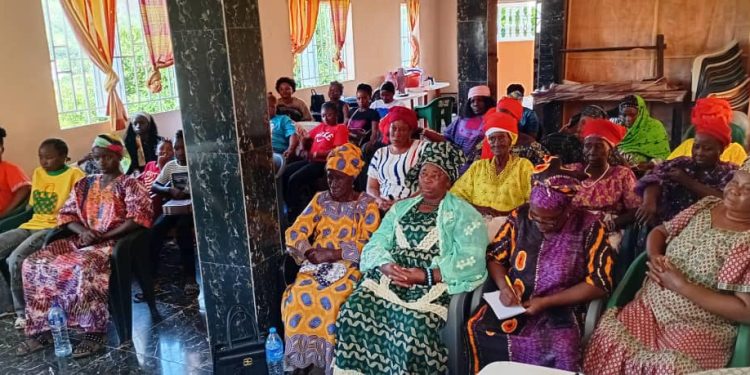By Hassan Osman Kargbo
With support from UNFPA Sierra Leone and the Embassy of Iceland in Freetown, Send Sierra Leone has hosted an intergenerational dialogue sessions that has been held across Koinadugu, Falaba, and Karene districts to accelerate the elimination of Female Genital Mutilation (FGM).
The sessions are designed to provide safe spaces where elders, parents, youth, health professionals, community-based organizations, and religious and traditional leaders meet to openly discuss harmful practices such as FGM. By creating room for dialogue, participants are encouraged to share personal experiences, health concerns, and cultural perspectives while examining the practice from legal and rights-based angles.
Organizers believe that tackling FGM requires not only legal action but also honest conversations that bridge generational divides. Elders and traditional leaders bring valuable cultural insights, while young people and health workers highlight the physical and psychological effects of FGM on girls and women. Together, they explore alternatives that honor tradition without causing harm.
The intergenerational approach ensures that the process of change is respectful, inclusive, and sustainable. Instead of imposing solutions, the dialogues provide opportunities for communities to negotiate change on their own terms. This makes it easier to build consensus, reduce resistance, and generate collective ownership of the fight against FGM.
Health professionals participating in the sessions have shared evidence of the long-term consequences of FGM, ranging from severe pain and infections to complications during childbirth and increased risk of maternal mortality. Legal experts have reminded communities that FGM is a violation of girls’ and women’s rights, reinforcing the importance of protecting future generations from harm.
Religious and traditional leaders, often viewed as custodians of culture, have played a particularly important role in these conversations. Many of them are helping to challenge long-standing beliefs that FGM is a requirement for womanhood, urging families to consider safer and healthier rites of passage. Their involvement is helping to shift mindsets in communities where cultural resistance has slowed progress in the past.
For parents and youth, the sessions have become a platform to openly discuss issues that are often considered taboo. Young women and men have spoken about the stigma surrounding girls who refuse to undergo FGM, while parents have raised concerns about the pressure they face from peers and extended families. Through open dialogue, participants are finding ways to support one another in resisting harmful practices.
According to organizers, the goal is not only to spark discussion but also to strengthen the capacity of frontline actors, including community-based organizations and health workers, to support local initiatives. The outcomes of these sessions are expected to feed into broader intergenerational conversations at district and national levels, amplifying community voices in the movement to end FGM.
Ultimately, the dialogues aim to shift harmful social norms, reduce stigma, and build community-led action. By encouraging unity across generations, the process is laying the foundation for lasting change.
As one participant from Falaba put it, “This dialogue has given us the courage to speak out. It is not easy to change traditions, but together we can choose better ways to protect our daughters.”
Through these collective efforts, partners and communities are working towards a Sierra Leone free from FGM, where cultural values are preserved without compromising the health, dignity, and rights of women and girls.













